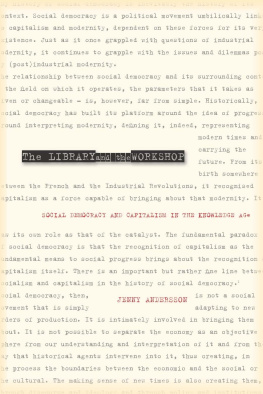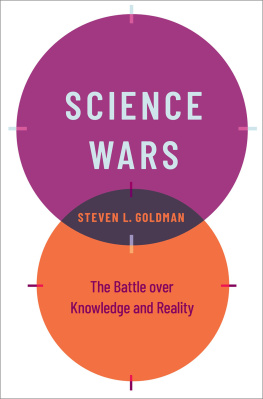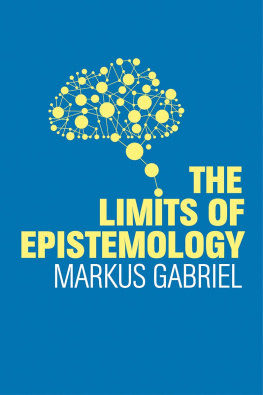
Goldman, Alvin I. Regents Professor of Philosophy, University of Arizona
Knowledge in a Social World
Publication date 1999 (this edition)
Print ISBN-10: 0-19-823820-7
Print ISBN-13: 978-0-19-823820-1
doi:10.1093/0198238207.001.0001
Abstract: A certain conception of social epistemology is articulated and applied to numerous social arenas. This conception retains epistemology's traditional interest in truth and reliable inquiry, but replaces its customary emphasis on solitary knowers with a focus on social institutions and interpersonal practices. Postmodernism, science studies, and pragmatism pose worries about the meaning and attainability of objective truth and knowledge. After laying these concerns to rest, veritistic social epistemology is advanced as a normative discipline seeking practices and institutions that would best foster knowledge. The book explores forms and methods of communication, including norms of argumentation, information technology, and institutional structures governing speech and the media. Social dimensions of knowledge quests are explored in science, law, democracy, and education. The book examines popular topics in contemporary epistemology such as testimony and Bayesianism, while breaking new ground by connecting epistemology with historically unrelated branches of philosophy such as political and legal theory. Democracy's success, it is argued, requires the attainment of certain epistemic desiderata, and substantive justice depends on well-chosen procedures of legal evidence.
Keywords: argumentation,Bayesianism,democracy,information technology,knowledge,legal evidence,media,science studies,social epistemology,truth
Knowledge in a Social World
end p.i
end p.ii
Knowledge in a Social World
CLARENDON PRESS OXFORD
end p.iii

Great Clarendon Street, Oxford ox2 6dp
Oxford University Press is a department of the University of Oxford
It furthers the University's objective of excellence in research, scholarship,
and education by publishing worldwide in
Oxford New York
Auckland Bangkok Buenos Aires Cape Town Chennai
Dar es Salaam Delhi Hong Kong Istanbul Karachi Kolkata
Kuala Lumpur Madrid Melbourne Mexico City Mumbai Nairobi
So Paulo Shanghai Taipei Tokyo Toronto
Oxford is a registered trade mark of Oxford University Press
in the UK and in certain other countries
Published in the United States
by Oxford University Press Inc., New York
Alvin I. Goldman 1999
The moral rights of the authors have been asserted
Database right Oxford University Press (maker)
First published 1999
All rights reserved. No part of this publication may be reproduced,
stored in a retrieval system, or transmitted, in any form or by any means,
without the prior permission in writing of Oxford University Press,
or as expressly permitted by law, or under terms agreed with the appropriate
reprographcs rights organization. Enquiries concerning reproduction
outside the scope of the above should be sent to the Rights Department,
Oxford University Press, at the address above
You must not circulate this book in any other binding or cover
and you must impose this same condition on any acquirer
British Library Cataloguing in Publication Data
Data available
Library of Congress Cataloging in Publication Data
Data available
ISBN 0-19-823777-4 (Hbk.)
ISBN 0-19-823820-7 (Pbk.)
end p.iv
To my brother Malcolm
whose intellectual challenges kindled my early curiosity
end p.v
end p.vi
Preface
This is the best of times, or this is the worst of times, for the social pursuit of knowledge. Optimists point with pride to the World Wide Web and the Information Superhighway. They exult in the fact that with every new photograph from the Hubble Space Telescope we get more precise information about distant galaxies and greater insight into the origin of the universe. When have we been better endowed with information and knowledge? Pessimists point to more worrisome conditions. Broadcast political news in America increasingly comes in bite-sized morsels, and the average citizen has been shown to have sparse political knowledge. Ownership and control of news outlets increasingly reside in a few powerful media conglomerates. A small number of industrial corporations have more public communications power than any private businesses have ever possessed in world history (Bagdikian 1997: ix-x). On this scenario we seem perilously close to an Orwellian nightmare. How should these dramatically divergent perspectives be reconciled? Just how good or how bad are the prospects for knowledge in contemporary society?
This book does not provide an inventory of the current conditions for knowledge. It does, however, explore the ways that human knowledge can be increased via social transactions, whatever the present starting point happens to be. It is a clich that ours is an information age; certainly it is an era in which issues of knowledge and information bombard us from every direction. What is missing, however, is a general theory of societal knowledge. What exactly is knowledge, as opposed to ignorance and error, and how can social factors contribute to its growth? This book attempts to construct such a theory. It lays philosophical foundations for a social theory of knowledge, and it assesses particular practices and institutions in terms of these foundations. It might be viewed as a philosopher's contribution to the shaping of an information-rich society.
This project falls within the subfield of philosophy that is standardly called "epistemology," but the project aims to widen epistemology's vista. Traditional epistemology has long preserved the Cartesian image of inquiry as an activity of isolated thinkers, each pursuing truth in a spirit of individualism and pure self-reliance. This image ignores the interpersonal and institutional contexts in which most knowledge endeavors are actually undertaken. Epistemology must come to grips with the social interactions that both brighten and threaten the prospects for knowledge. Although initial steps in the social direction have been taken in recent years, the present book aims to
end p.vii
construct a unified framework and a more detailed agenda for this epistemological expansion.
There is another reason to pursue this project. Many academic corridors are flooded by the fashionable currents of postmodernism and (radical) social constructionism, which purport to be replacements for traditional epistemology. These movements are appropriately sensitive to social factors in thought and discourse, but they repudiate the hallmarks of traditional epistemology: the quest for truth, reason, and objectivity. They imagine that social factors necessarily cripple the prospect of anybody ascertaining truth at all; the very intelligibility of objective truth or knowledge is denied. These misguided ideas have led to rampant relativism in fields outside of philosophy, including law, history, education, cultural studies, and science studies. Many philosophers serenely dismiss these movements with the wave of a hand, but their influence has serious consequences and should not be taken lightly. Worries on this score have been expressed by Farber and Sherry (1997) concerning the law, and by Appleby, Hunt, and Jacob (1994) concerning history. Analogous concerns led the physicist Alan Sokal to effect a celebrated spoof of cultural studies by publishing an article full of gibberish (Sokal 1996









